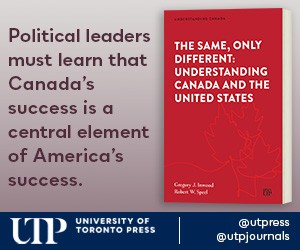U.S. protests over the Government of Canada’s poor record on protecting copyright owners is merely a “political tool,” says a staff briefing note to Trade Minister Mary Ng. The United States placed Canada on its 2024 “watch list” over concerns on copyright thievery.
“It serves as a political tool to satisfy domestic U.S. stakeholders,” said the April 25 briefing note. “The United States has strong offensive interests in the protection and enforcement of intellectual property rights globally and in this report places countries alleged to have inadequate intellectual property laws in three escalating categories: ‘Watch List,’ ‘Priority Watch List’ and ‘Priority Foreign Country.’”
“Canada is on the ‘Watch List’ for 2024,” said the briefing note Special 301 Report On Intellectual Property Protection. “Canada does not recognize the validity of the report.”
Any complaint that the Government of Canada tolerates copyright theft “relies primarily on industry allegations rather than empirical evidence and objective analysis,” said the note to Minister Ng. “We continue to engage bilaterally and constructively on intellectual property issues with the United States.”
The United States Trade Representative in an April 25 Special 301 Report placed Canada on its “watch list” for numerous shortcomings in protecting copyright. “Levels of online piracy remain very high in Canada,” it said. Court rulings allowing mass copying of literary works had also “significantly damaged the market for educational authors and publishers,” it said.
Canadian authors and publishers have lost more than $200 million in royalties since a 2012 Supreme Court ruling allowed mass photocopying of books under the guise of “personal research.” One institution, York University of Toronto, admitted in Court documents it distributed 29 million photocopies in student course packs without payment or permission.
Department of Justice lawyers weeks after the “watch list” was issued also won a May 31 Federal Court ruling in Blacklock’s Reporter v. Attorney General that expanded copyright theft to include password sharing. The U.S. Trade Representative has not yet commented on the ruling.
Evidence in the Blacklock’s case showed a Parks Canada manager, Genevieve Patenaude, purchased a single password then shared it with anyone who asked, at least nine people. Justice Yvan Roy ruled that while Patenaude made an obvious “mistake” – Blacklock’s terms against password sharing were “plainly visible,” he said – passwords could now be shared by anyone for any “legitimate business reason” where there is “significant public interest in reading articles.”
Neither Minister Ng nor her department publicly discussed the impact of the password ruling. Finance Minister Chrystia Freeland told reporters June 19 that while she too shared password-protected news articles, “I am a huge believer in the value of the work that all you guys do, the work of professional, salaried journalists.”
By Staff 







